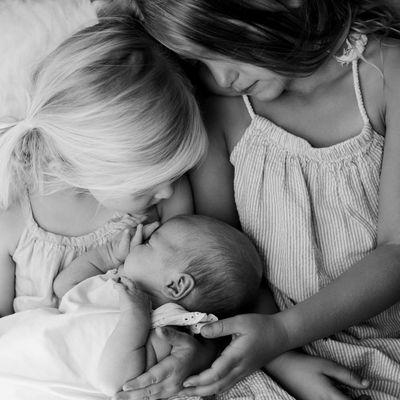
How To Help A Child Adjust To A New Sibling
Start The Process Before The Baby Arrives
“It’s important to get your child – no matter their age – prepared and involved in conversations about their future sibling during your pregnancy. Talk about the new baby in a positive way and explain that their new sibling is growing in your tummy, so it’s not a shock when there’s suddenly a tiny, noisy, new person in the house that needs your attention too. It can be difficult for a young child to grasp that your ever-growing stomach has a small human inside. Picture books can help – my eldest son was two-years-old when I became pregnant and we found reading him books about ‘becoming a big brother’ and ‘the new baby’ were a great way to help him visualise what was going to happen.” – Kate Murnane, author of The Little Book of Mum Hacks
Think About Your Language
“Try to get your child involved in the pregnancy as much as possible – this will help them feel more connected to the baby and like they have a space in the baby’s life. Say things to your child like ‘The baby only moves when you have your hand on my stomach’, or ‘I’m sure that kick was for you’. Just be careful of moaning and groaning about your pregnancy – this could encourage your child to resent the baby, who appears to be making their mother suffer.” – Dr Shadi Shahnavaz, head of family therapy at The Soke
Make Time To Adjust Routines
“If a child’s routine needs to be adapted when the baby arrives, then consider making changes ahead of time to ensure a smooth transition. For example, if one parent is likely to be doing bath-time every night, then make that change prior to the baby’s birth so this routine change isn’t associated with them. If the child is ready, it’s also worth ensuring big changes such as potty training or moving into a big bed are done well before the new arrival. If they are not ready, then it is preferable to leave this until things have settled down again.” – Chris Alderton and Rose Burton, co-founders of Expect The Best
Boost Their Confidence
“Try telling your child what a great older sibling they are going to be. When I was expecting, I kept telling my son what a great big brother he was going to be and how helpful he was being – this can help boost their confidence and self-esteem. He really liked the thought of being the ‘big’ one, which is often important to toddlers who don’t want to be treated like a baby anymore, and it helped reinforce that having a younger child in the house was a good thing.” – Kate
…But Be Wary Of Giving A Child Too Much Responsibility
“Without realising, it can be easy to start to shift your first born into the position of ‘big sister’ or ‘grown up’. Whilst this is indeed how it will go, giving too much responsibility to your eldest may cause them to become unsettled – including regressing with potty training and or eating and sleep. Try and reassure your eldest – saying things like ‘you will always be our first baby’ and ‘you are still my baby too’ – which will help them feel like their place has not been shifted which can have a huge impact on how well the transition goes.” – Heidi Skudder, The Parent and Baby Coach
Don’t Get Overexcited
“Parents’ own excitement about the new arrival often results in unrealistic expectations being placed upon their existing child or children to feel the same. It’s vital to be mindful that your own excitement does not necessarily translate to a child’s, so try not to force it. Constantly reminding your child they are going to be a sibling can be confusing – you are asking a child to understand a concept they are yet to experience and therefore the child has no point of reference. Try to let conversations be led by your child and consider using books as a tool to introduce the subject – ‘My New Baby’ by Rachel Fuller is one of our favourites.” – Chris and Rose
Know How To Deal With Bringing The Baby Home
“It’s preferable that your child has the opportunity to be united with its parents and has a chance to re-bond before there are any mentions of the baby, especially if there has been a period of separation. Some children will be excited to meet the baby, and others won’t be – try not to get caught up in their initial reaction. When visitors come to see you and the baby, encourage them to respect that the older child was there first, and ask them to say hello to older children first. If visitors bring the baby a present, make sure your older child is engaged when you are unwrapping it. If your child becomes aware that people are bringing the baby presents, it can be a nice idea to show the child a selection of the things that people brought them when they were born.” – Chris and Rose
Understand Toddlers May Struggle More
“When welcoming a new baby with a toddler around, it is often the case they will quickly get used to the new dynamic without too much fuss. I tend to find the toddlers that struggle more are the ones who have had their parents to themselves for longer, usually from two-and-a-half years and up. Whereas the physical impact of two under two is full on, the emotional transition for having two with one over two can be trickier.” – Heidi
Look For Behavioural Changes
“Reverting back to old ways when it comes to eating and toilet habits can be normal for some children upon the arrival of a sibling. It’s fine to indulge in this for a little while – after all, this is your child’s way of asking to be treated like a baby – but if it continues or you find it tricky to manage, try and look to other ways of boosting their self-esteem and confidence. This may include ‘love bombing’ – i.e., spending one-to-one time with them as much as possible, and using descriptive praise to boost the positive attention you are giving them.” – Heidi
Don’t Let Your Child Latch Onto One Parent
“It’s not uncommon for a child to cling to one parent more than the other after the arrival of a new baby. Try not to be alarmed if this happens – it’s all part of a natural reaction to change and will settle down in time. If a child does start showing preference for one parent, it’s important not to encourage this behaviour. It can be tempting to give in and make life easier, but in the long-term it’s not helpful. Consider acknowledging the child’s wish for the other parent but continuing as normal, perhaps suggesting that when an activity is complete, the other parent comes and gives the child a kiss and cuddle.” – Chris and Rose
Teach Them To Be Gentle
“Most children will naturally understand the need to be gentle with a new baby, although if you find yourself in the position where your eldest is poking and being heavy handed, teaching them the concept of ‘gentle hands’ can be a useful exercise. Practising this by role playing with dolls can be great, as well as reading stories such as Hands Are Not For Hitting. If there is any rough play and something happens you are not happy with (for example, your child throws a toy at the baby), make sure to use your ‘no’ to let them know this is not okay.” – Heidi
Try To Understand Their Anger
“If your child is aggressive and rough with their new sibling, it’s important to understand what’s behind this anger. The emotion of anger usually has a bedfellow, meaning it has another emotion that sits alongside it, such as frustration, sadness, loneliness or jealousy. Perhaps it’s that your child needs some more one-on-one attention – if this is the case, take advantage of your new baby’s nap time to sit down and do an activity. It can be tempting to focus on the immediate behaviour, but you will have more success if dealing with the root cause of the issue.” – Chris and Rose
Remember Your Child Learns From You
“Children learn a huge amount from watching adults they love and care about. Role playing being gentle and kind will go a long way in teaching your little one how to act around a baby. Don’t forget it’s okay to show them you are feeling tired or upset – showing emotions is one of the healthiest habits you can show your child.” – Heidi
Buy Them A Gift
“One of the most effective things we did to prepare our eldest son was to buy him a present for when the baby arrived – to make him feel special and included. My parents did this for me when my little brother was born and I still remember it to this day – it was a little pink box filled with baby nappies, a bottle and a dummy for my dolls. This can be a good way to help your children bond initially.” – Kate
Split Your Time Between Them
“Spending double time with both your children is key. That’s time alone with your child, and time together with the new baby. This will give your older child double reassurance that they are still your number one child, and that they are also included in the new relationship with the baby. This will help them develop a secure attachment to you which will set them up to for other healthy relationships based on trust, not anxiety and uncertainty.” – Amanda Seyderhelm, certified play therapist
Drop The Guilt
“Try not to spend too much time worrying. As mums, we find so many things to feel guilty about, but as soon as your baby arrives your family will naturally start to adapt and adjust. It’s natural to worry that a baby will change the relationship you have with your first child, but having another baby doesn’t halve your love, it doubles it. The minute my youngest was born, any worries or fears I had about loving another child as much went away instantly. Your heart just grows and it’s the most amazing thing to see your children meet for the first time.” – Kate
The Little Book of Mum Hacks by Kate Murnane is published by Seven Dials in Hardback, £12.99 and is out on 23rd February. For more information visit KateMurnane.com, TheSoke.uk, ExpectTheBest.uk, TheParentAndBabyCoach.com and AmandaSeyderhelm.co
DISCLAIMER: We endeavour to always credit the correct original source of every image we use. If you think a credit may be incorrect, please contact us at info@sheerluxe.com.


